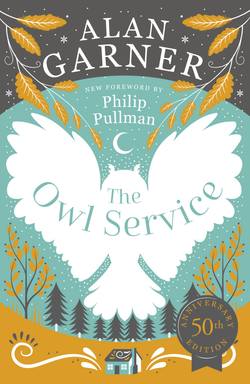Читать книгу The Owl Service - Alan Garner, Alan Garner - Страница 17
CHAPTER 6
ОглавлениеShe was tall. Her long hair fell to her waist, framing in gold her pale and lovely face. Her eyes were blue. She wore a loose gown of white cambric, embroidered with living green stems of broom and meadowsweet, and a wreath of green oak leaves in her hair.
“Gave me quite a turn, she did,” said Gwyn. “There was just her eyes showing at first, but that pebble-dash soon came off.”
“She’s so beautiful!” said Alison. “Who’d want to cover her up?”
“Sixteenth century, if it’s a day,” said Roger. “Fresh as new. How’s it survived under that lot?”
The woman was painted life-size in oils on wooden panelling. She stood against a background of clover heads spaced in rows.
“What a find!” said Roger. “It’ll fetch thousands.”
“Not so fast,” said Gwyn. “We’ll keep our mouths shut. You’ll have to organise your Dad, and the one person who mustn’t know is my Mam.”
“Why, for heaven’s sake? Don’t you realise? You’ve a masterpiece here.”
“My mam would take an axe to it,” said Gwyn. “Start thinking. You’ve not asked me how I found it.”
“How did you, then?” said Alison.
“It was your plates. I was coming back in here when I heard them smash. They’d been chucked against the pebble-dash, and a piece fell off.”
“Why should this make your mother wreck it?” said Alison.
“My Mam’s scared stiff about something. She’s grim at the best of times, but not this bad. It’s the plates, isn’t it, Alison?”
“How should I know?”
“Guessing; and what Huw said. ‘Mind how you are looking at her,’ and now in the yard, ‘She’s coming,’ he said.”
“What does that mean?” said Roger.
“You can’t tell. He could be talking about the weather. It’s called ‘she’ in Welsh.”
“Then that’s it,” said Roger.
“But if it isn’t?” said Gwyn. “Someone cared enough about the painting and the plates to lug a dinner service into the roof and to pebble-dash this wall. You don’t go to all that trouble for nothing. Somebody wanted them hidden, and now they’re not hidden. They’re – loose.”
“It might not have been the same person. And there’s no harm, whatever the reason is,” said Alison, “not if we find something as wonderful as this.”
“Have you looked close? Marvellous detail, isn’t it?” said Gwyn.
“Every strand of hair,” said Roger. “I can’t get over how it’s stayed so clean all this time.”
“Marvellous,” said Gwyn. “Have you looked at them clover heads, boyo?”
“Great stuff: like heraldry,” said Roger. He went right up to the panelling. “And yet you could pick them—” Roger stepped back. “Oh no,” he said.
“What’s the matter?” said Alison. She looked. The heads were formed of curved white petals bunched together, each painted separately, fine and sharp. But the petals were not petals: they were claws.
“Someone had a nasty mind,” said Roger.
“Or maybe that’s the way it was when they painted it,” said Gwyn. “Nasty.”
“You can’t have flowers made of claws,” said Roger.
“Why not? You can have owls made of flowers, can’t you?” said Gwyn. “Let’s bring the plates down. I want to see them close to – and with the pattern on. Leave this pebble-dash: I’ll clear it up later. And don’t say anything about this wall until we’ve had a think.”
They arranged that Gwyn and Roger should take the plates out of the loft and lower them from the bedroom window in a linen basket to Alison, who would be waiting with a barrow.
“I’m getting cold feet over this,” said Roger. “Shouldn’t we leave it as it is, and nail the loft up?”
“There’s something in this valley,” said Gwyn, “and my Mam’s on to it. She’s been like the kiss of death since she saw them plates. That clover: them plates: it’s owls and flowers, and it’s dangerous.”
“So nail the loft up,” said Roger. “If you’d seen Ali last night you wouldn’t be keen.”
“That’s why I’m shifting the plates,” said Gwyn. “Get them away from her first, and then we can think. I’ve not had a proper look at them paper models she makes: are they genuine?”
“Absolutely. I’ve watched her. It’s dead clever the way she traces the patterns out so it fits together.”
“Does she really keep losing them?”
“I think so,” said Roger. “She’s quite het up about it.”
“So I’ve noticed,” said Gwyn. “We must disconnect her.”
“Disconnect?”
“That’s about it. Batteries can’t work without wires.”
Gwyn went up into the loft, and handed the dinner service to Roger, who put it in the linen basket and lowered it on a rope to Alison, then Gwyn measured the hatch, and came down.
“You know, I think we’re being a bit overwrought about all this,” said Roger. “When you see them they are just plates. And perhaps it was just mice.”
“Mice,” said Gwyn. “I’d forgotten. I set a cage trap.”
He climbed up the ladder and opened the hatch. Roger could see him from the waist down. He stood very still.
“Have you caught anything?” said Roger.
“You’ve seen a cage trap, haven’t you?” said Gwyn. “You know how it works – a one-way door: what’s in it can’t get out: right?”
“Yes,” said Roger. “Have you caught anything?”
“I think I’ve caught a mouse,” said Gwyn.
“ ‘Think’?”
Gwyn came down the ladder. He held out the cage. Inside was a hard-packed ball of bones and fur.
“I think it’s a mouse,” he said. “Owls aren’t fussy. They just swallow straight off, and what they don’t want they cough up later. That’s an owl’s pellet: but I think it was mouse.”
